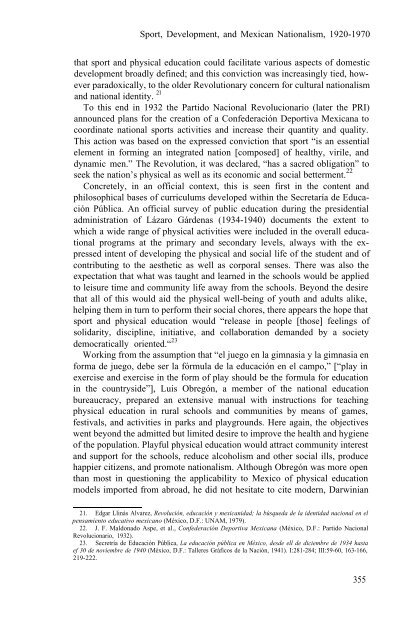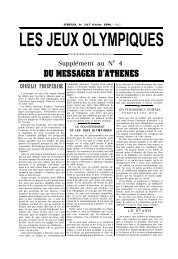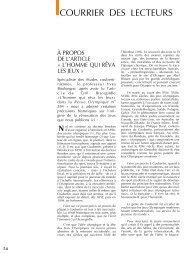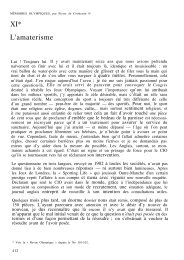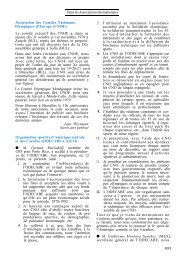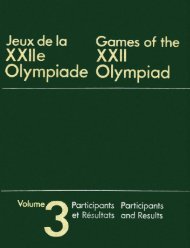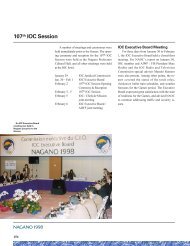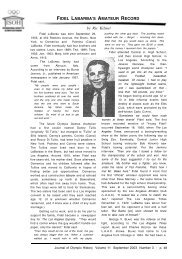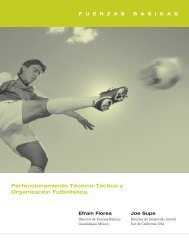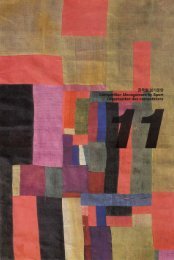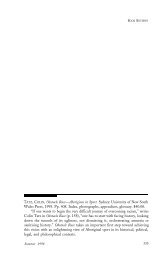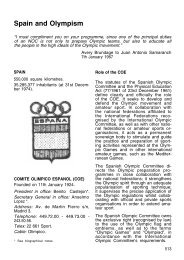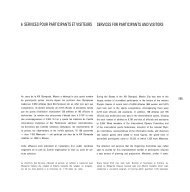Sport Development and Mexican Nationalism - LA84 Foundation
Sport Development and Mexican Nationalism - LA84 Foundation
Sport Development and Mexican Nationalism - LA84 Foundation
You also want an ePaper? Increase the reach of your titles
YUMPU automatically turns print PDFs into web optimized ePapers that Google loves.
<strong>Sport</strong>, <strong>Development</strong>, <strong>and</strong> <strong>Mexican</strong> <strong>Nationalism</strong>, 1920-1970<br />
that sport <strong>and</strong> physical education could facilitate various aspects of domestic<br />
development broadly defined; <strong>and</strong> this conviction was increasingly tied, however<br />
paradoxically, to the older Revolutionary concern for cultural nationalism<br />
<strong>and</strong> national identity. 2l<br />
To this end in 1932 the Partido Nacional Revolucionario (later the PRI)<br />
announced plans for the creation of a Confederación Deportiva <strong>Mexican</strong>a to<br />
coordinate national sports activities <strong>and</strong> increase their quantity <strong>and</strong> quality.<br />
This action was based on the expressed conviction that sport “is an essential<br />
element in forming an integrated nation [composed] of healthy, virile, <strong>and</strong><br />
dynamic men.” The Revolution, it was declared, “has a sacred obligation” to<br />
seek the nation’s physical as well as its economic <strong>and</strong> social betterment. 22<br />
Concretely, in an official context, this is seen first in the content <strong>and</strong><br />
philosophical bases of curriculums developed within the Secretaría de Educación<br />
Pública. An official survey of public education during the presidential<br />
administration of Lázaro Gárdenas (1934-1940) documents the extent to<br />
which a wide range of physical activities were included in the overall educational<br />
programs at the primary <strong>and</strong> secondary levels, always with the expressed<br />
intent of developing the physical <strong>and</strong> social life of the student <strong>and</strong> of<br />
contributing to the aesthetic as well as corporal senses. There was also the<br />
expectation that what was taught <strong>and</strong> learned in the schools would be applied<br />
to leisure time <strong>and</strong> community life away from the schools. Beyond the desire<br />
that all of this would aid the physical well-being of youth <strong>and</strong> adults alike,<br />
helping them in turn to perform their social chores, there appears the hope that<br />
sport <strong>and</strong> physical education would “release in people [those] feelings of<br />
solidarity, discipline, initiative, <strong>and</strong> collaboration dem<strong>and</strong>ed by a society<br />
democratically oriented.“ 23<br />
Working from the assumption that “el juego en la gimnasia y la gimnasia en<br />
forma de juego, debe ser la fórmula de la educación en el campo,” [“play in<br />
exercise <strong>and</strong> exercise in the form of play should be the formula for education<br />
in the countryside”], Luis Obregón, a member of the national education<br />
bureaucracy, prepared an extensive manual with instructions for teaching<br />
physical education in rural schools <strong>and</strong> communities by means of games,<br />
festivals, <strong>and</strong> activities in parks <strong>and</strong> playgrounds. Here again, the objectives<br />
went beyond the admitted but limited desire to improve the health <strong>and</strong> hygiene<br />
of the population. Playful physical education would attract community interest<br />
<strong>and</strong> support for the schools, reduce alcoholism <strong>and</strong> other social ills, produce<br />
happier citizens, <strong>and</strong> promote nationalism. Although Obregón was more open<br />
than most in questioning the applicability to Mexico of physical education<br />
models imported from abroad, he did not hesitate to cite modern, Darwinian<br />
21. Edgar Llinás Alvarez, Revolución, educación y mexicanidad; la búsqueda de la identidad nacional en el<br />
pensamiento educativo mexicano (México, D.F.: UNAM, 1979).<br />
22. J. F. Maldonado Aspe, et al., Confederación Deportiva <strong>Mexican</strong>a (México, D.F.: Partido Nacional<br />
Revolucionario, 1932).<br />
23. Secretría de Educación Pública, La educación pública en México, desde ell de diciembre de 1934 hasta<br />
ef 30 de noviembre de 1940 (México, D.F.: Talleres Gráficos de la Nación, 1941). I:281-284; III:59-60, 163-166,<br />
219-222.<br />
355


